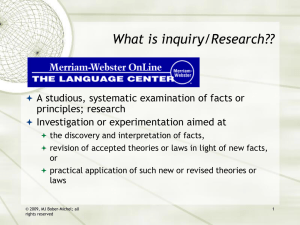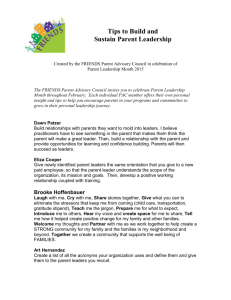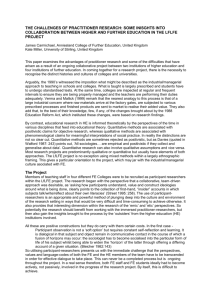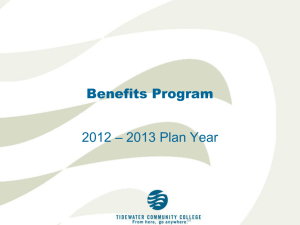Is Project Marketing A Part O F Project Management
advertisement
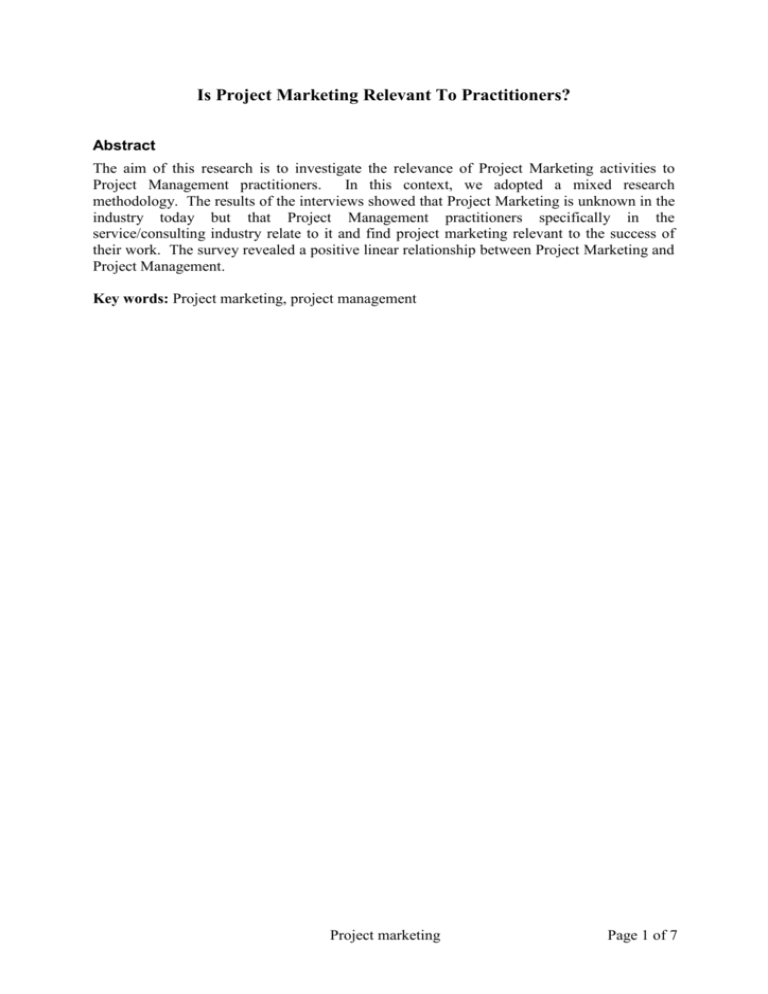
Is Project Marketing Relevant To Practitioners? Abstract The aim of this research is to investigate the relevance of Project Marketing activities to Project Management practitioners. In this context, we adopted a mixed research methodology. The results of the interviews showed that Project Marketing is unknown in the industry today but that Project Management practitioners specifically in the service/consulting industry relate to it and find project marketing relevant to the success of their work. The survey revealed a positive linear relationship between Project Marketing and Project Management. Key words: Project marketing, project management Project marketing Page 1 of 7 Introduction Project marketing is a concept still in development and appears not to be well practiced in industry. Current competitive pressures require organizations to adopt to adopt a higher degree of market orientation for their projects and to build and maintain strong relationships with their customers, (Pinto & Rouhiainen, 2001; Davis & Pharro, 2003). Recent studies in project management have broadened the way of looking at this field by incorporating customer based approach moving closer to the worldview adopted by project marketing (Cova & Salle, 2005, auteur, 2010). According to the view adopted by researchers in project marketing, project marketing is a broader term that includes project management, by which we mean that project marketing sets the project in the wider context of the project business. On the other hand, project managers describe project management as a process and identify project marketing as a project management task. They believe that project marketing is one of the roles of a project manager. Research questions are the following; (1) What are the different perspectives of Project Marketing in regard with both disciplines? (2) How relevant is Project Marketing to project management practitioners? Project marketing from the perspective of marketers Kotler and Lane (2008) define marketing as “satisfying needs and wants through an exchange process”. Marketing is essentially about providing changing benefits to the changing needs and demands of the customer. Project Marketing adopts a marketing perspective on projects. Through Project Marketing, a firm manages multiple projects that it does for a given client, focusing on the long term consequences of the projects it does on the customer’s business. Project marketing researchers (including: Cova et al, 2002; Tikkanen et al, 2003; Skaates, 2003; auteurs, 2006; and Blomquist & Wilson, 2007) claim that while project management deals with organizational and management issues, project marketing deals with sales and marketing issues of projects. They define a project strictly from the marketing perspective, stating that a project is a complex transaction covering a package of products, services and works, specifically designed to create capital assets that produce benefits for a buyer over an extended period of time (Cova, & Salle, 2005). They emphasize that the project concept must be redefined to include the activities from the very early pre-project phase to the very late post-project phase. These broader time frames have diverse origins (Cova, B., & Salle, R., 2005): Customer based approach to project management; Supply chain management; Project strategic orientation. But project marketing is also a continuous process that occurs during the realization and project follow up phases. For this reason auteurs (2006) propose fourth phase to the project marketing process: Project marketing Page 2 of 7 Figure 1: Four phases of project marketing (after auteur, 2006) The 4th phase corresponds to the conditions for future projects: The supplier maintains the relationship with the client, through logistics support, which enables to manage discontinuity in project business and prepare for future projects. Project marketing researchers consider overcoming demand-related discontinuity to be one of the major strategic issues in project marketing. This phase of discontinuity is very important as relationships here are maintained by social and informational exchange throughout the phase and affect future business (Skaates & Tikkanen, 2002): Project marketing from the perspective of project management researchers Figure 2: The project management process, (after Gareis, 2005, 2006). According to project management researchers, the project marketing process starts after the project assignment and stops before the project approval phase (see above figure, after Gareis, 2005; 2006). Project marketing is a part of the project management process, which is a continuous process. Here a project discontinuity can be described as a project crisis, opportunity or phase transition. During this process from project assignment to project approval, project marketing is practiced in parallel to project coordination. But here there is no mention on project marketing between two projects whereas marketeers suggest this is an essential phase where relationships and communication must be maintained to identify new project’s opportunities and ensure a continuous activity of the company. Nevertheless project management researchers believe that project marketing process will ensure appropriate management attention and minimize conflicts in the project and in the Project marketing Page 3 of 7 relationships with relevant environments. According to this view, project marketing can be defined as project-related communication with relevant project environments, (Turner et al, 2010; Müller & Turner, 2010). Thus key components of project marketing are: negotiating the fuzzy front end, structuring the project solution, managing stakeholder relationships, interrelationships of marketing and project management and marketing in the project based firm (Gareis, 2006). In projects, we can note the difference between object-oriented marketing activities (such as cost/benefit of the project results) and process-oriented activities. Project marketing should be performed by all members of the project organization. Accomplishing these goals requires a new orientation of the project manager’s roles and responsibilities. The project managers now also have marketing responsibilities (Müller & al., 2010). Our research project Methodology We used a mixed methods approach, with interviews and a survey questionnaire (Berthier N., 2002). This approach is intended to provide a practical dimension to our research theory that states Project Marketing is relevant to Project Management practitioners. The philosophical stance adopted by this research is critical realism (acc. to Bhaskar, 1975). We firstly conducted 45 semi-structured interviews. We interviewed experienced project management practitioners although they could have a title of Business Development Manager, Program Manager, Portfolio Manager, Pre-sales engineer, and consultant. And we used inductive qualitative analysis, by which we conducted template analysis as described by Saunders et al (2007). Then a quantitative research method was adopted to provide a practical dimension to Project Marketing theory. There were 21 questions in the questionnaire, each analyzing a concept of Project Marketing and/or Project Management and attempting to evaluate the relevance of these concepts to Project Management practitioners. The questions tested the relevance of the following concepts: 4 Phases of Project Marketing: Pre-Project Marketing, Marketing at the start of the project, Ongoing Project Marketing, Marketing to create future conditions. 4 Characteristics of Project Business: Uniqueness, Complexity, Discontinuity, Extent of Financial Commitment 6 Stages of Project Marketing process: Identification of a need, Pre-feasibility study, Feasibility study, Identification of potential sellers/buyers, Tender/Offer Invitations, Negotiations. 4 different ways to limit the discontinuity of relationships between client and supplier. Project Marketing investigates “request for a proposal”, “call for tenders”, and “competitive bidding”. As a discipline, Project Marketing relates to the various marketing activities that take place prior to winning the contract. Project timeframe depends on the following factors: customer focus, supply chain management, strategic orientation. As a discipline, Project Marketing focuses on building and maintaining long lasting relationships with key clients and stakeholders avoiding short term opportunism. Project marketing Page 4 of 7 Project Marketing sees the world through the eyes of a marketer in charge of successfully managing a strategic business unit in order to achieve best performance. Project Management is a large strategic initiative where organizations are involved in multiple projects and these projects are used as instruments of change. Project Marketing is a Project Management task and hence Project Management encompasses Project Marketing. Project Marketing can be defined as project-related communication hence making it one of the Project Management initiatives. Results and discussion Project Marketing researchers suggest that project management is part of project marketing, whereas project management researchers suggest project marketing is part of project management. We found that there is no clear answer to this question and it depends on the perspective you take. However, the analysis of our interviews and survey data pointed out that Project Marketing principles are comprehended and considered significant by the Project Management practitioners in the industry. Project Management practitioners not only recognize the significance of Project Marketing but furthermore show an unfettering interest in its existence and promotion among all Project Managers. Those Project Management professionals who have a background in marketing and are in the service/consulting industry illustrated an in depth knowledge of Project Marketing without actually knowing the term. They were able to provide concrete instances and examples that they have personally witnessed in each of the four Project Marketing phases. When asked about the relationship between Project Marketing and Project Management they believed the line of distinction to be blurred and both the roles to be capable of being merged. They believe that both these functions need to be engaged in but they don’t have to be done by the same person. Moreover survey notably showed a positive correlation of moderate strength between Project Management and Project Marketing. Besides survey respondents, practically all of whom are Project Managers, were able to relate the Project Marketing principles to Project Marketing discipline without knowing the term or its association. Furthermore, project managers describe the phase pre-project marketing as relevant to their trade but do not see themselves heavily involved at this stage as well at the phase intended to create a new project. Finally, depending on the perspective adopted, the image changes. If we adopt a marketing perspective, Project Managers declare that Project marketing is not larger in terms of budget that should be dedicated to it or the amount of staff that should be dedicated to it but it is larger conceptually speaking. It encompasses some of the same skills and tasks of project management but it overarches those things as well and includes a whole variety of other tasks. They believe that when project management researchers state that project marketing is project related communication only and a component of project management, it demonstrates a very limited knowledge of communication. On the contrary, when a Project Management perspective is adopted, when you are a Project Manager, Project Marketing is contemplated as marketing a specific project and in order to market the project the project has to exist and first and foremost it has to be managed well. And as a Project Manager the priority is to manage the project well and not to market the project. Therefore, in this scenario Project Marketing is integrated within Project Management. Project marketing Page 5 of 7 To conclude, Project Marketing can be defined as management of multiple projects focusing on the long term consequences on customer’s business. Even though our research study illustrates that there is a distinct relationship between Project Marketing and Project Management, we cannot deduce from the results whether one is a subset of another. Future researches should investigate the project portfolio management also as Project portfolio management is concerned with the idea that companies should not only concentrate on managing projects and their specific objectives but also on managing the project as a tight entity with shared objectives. Consequently Project marketing and project portfolio management are both powerful strategic initiatives that help organizations understand their vision and mission. Therefore, it is essential for all organizations to understand these concepts and embed them in their corporate strategy. References Berthier N. (2002). Les techniques d’enquête. Méthode et exercices corrigés. Paris: Armand Colin. Bhaskar, R. (1975). A Realist Theory of Science. London: Leeds. Blomquist, T. & Wilson, T. (2007). Project marketing in multi-project organizations: a comparison of IS/IT and engineering firms. Industrial Marketing Management. 36(2):206-218 Cleland, D.I., and King, W.R. (1983). Systems Analysis and Project Management. 3rd. ed., New York: McGraw-Hill. Cova, B. & Hoskins, S. (1997). A twin-track networking approach to project marketing. European Management Journal. 15(5):546–556. Cova, B., Ghauri, P. & Salle, R. (2002). Project marketing – beyond competitive bidding. Chichester: Wiley. Cova, B. & Salle, R. (2005). Six key points to merge project marketing into project management. International Journal of Project Management, 23(5):354–359. Crawford, L., Hobbs, B. & Turner, R. (2006). Aligning capability with strategy: categorizing projects to do the right projects and to do them right. Project Management Journal, 37(2):38-50 Davis, A. & Pharro, R. (2003). The Relationship Manager: the next generation of project manager. Aldershott: Gower. Gareis, R. (2005). Happy Projects!. Vienna: Manz.. Gareis, R. (2006). Project management: a business process of the project-oriented company. In Cleland, D. & Garies, R. (eds). The Global Project Management Handbook. 2nd edition. New York: McGraw Hill. Gareis, R. & Stummer, M. (2008). Processes and Projects. Vienna: Manz. International Project Management Association. (2006). ICB: IPMA Competence Baseline. Zurich: International Project Management Association. Kotler, P. & Lane, K. (2008). Marketing Management. Prentice Hall. auteur (2010). Project Oriented Leadership. Aldershott: Gower. Office of Government Commerce. (2009). Managing Successful Projects with PRINCE 2, 5th edition. London: The Stationery Office. Pinto, J.K. & Rouhiainen, P.J. (2001). Building Customer-based Project Organizations. New York: Wiley. Saunders, M., Lewis, P. & Thornhill, A. (2007). Research Methods for Business Students, (4th edition). London: Financial Times Press. Skaates, M.A. & Tikkanen, H. (2003). International project marketing: an introduction to the IN bPM approach. International Journal of Project Management, 21, pp. 503-510. Project marketing Page 6 of 7 Tikkanen, H., Kujala, J. & Artto, K. (2007). The marketing strategy of a project-based firm: the four portfolios framework. Industrial Marketing Management 36(2):194-205. Turner, J.R, Huemann, M., Anbari, F.T & Bredillet, C.N. (2010). Perspectives on Projects. London and New York: Routledge. Project marketing Page 7 of 7


